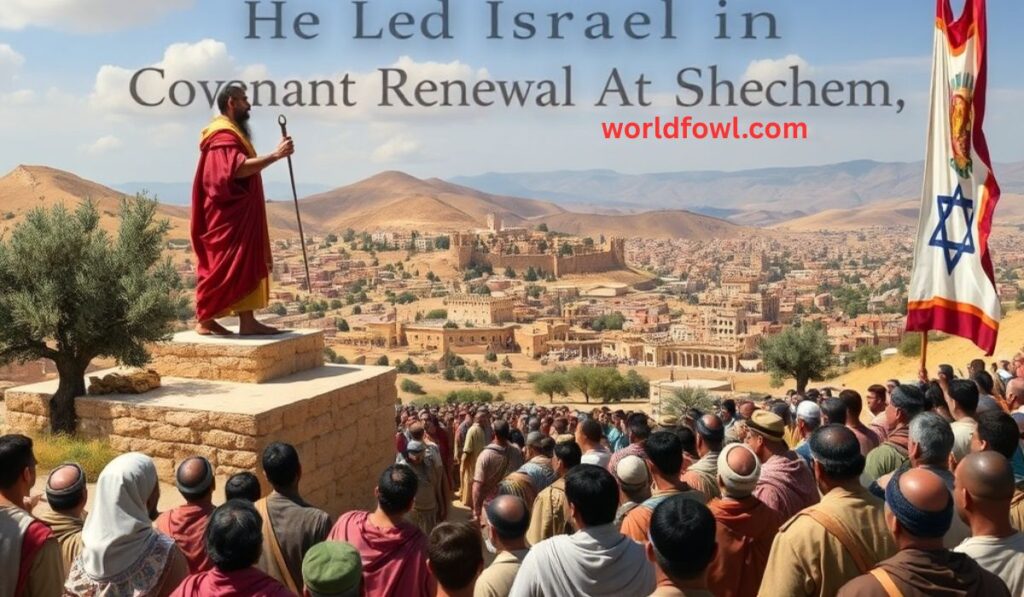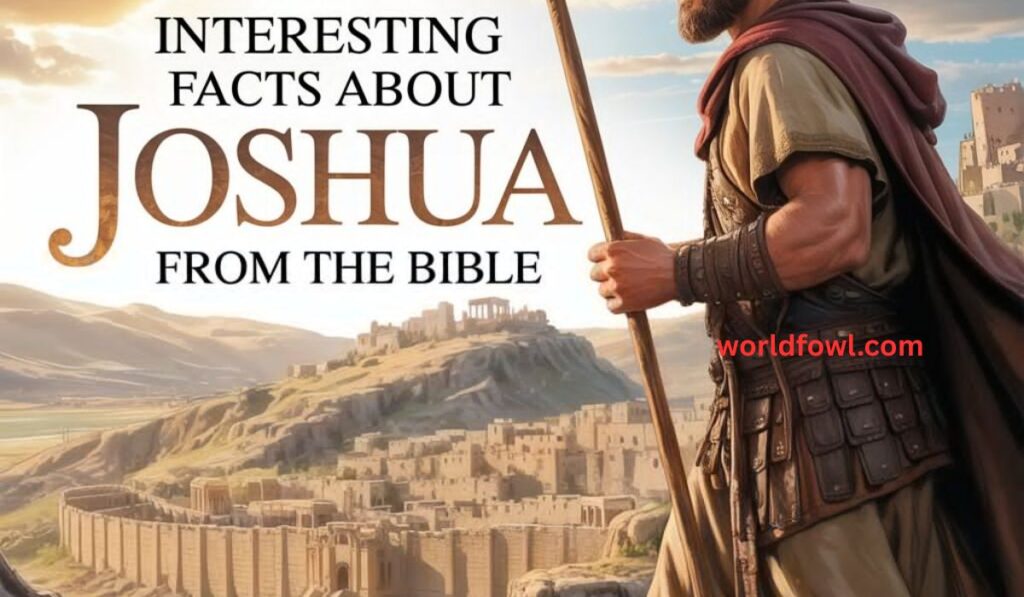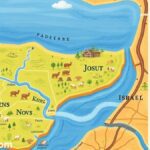The phrase “interesting facts about Joshua from the Bible” refers to details that show his life, leadership, and faith. Joshua was chosen by God to lead the Israelites into the Promised Land, and these facts highlight his courage, obedience, and spiritual legacy. Learning the interesting facts about Joshua from the Bible helps us understand his importance in history.
Filled with miracles, victories, and divine guidance, the interesting facts about Joshua from the Bible inspire believers with lessons of faith and strength. His story is more than history; it is a guide for living with courage and devotion.
When you read the interesting facts about Joshua from the Bible, you discover his role as Moses’ successor, his great victories, and his faithfulness to God. These interesting facts about Joshua from the Bible provide wisdom, encouragement, and inspiration for anyone seeking a deeper connection with faith.
Joshua Started as Moses’ Personal Attendant
Long before Joshua led armies, he served. Exodus 24:13 introduces him as Moses’ “minister” or attendant—not just a casual follower but someone who stayed close, learned deeply, and absorbed everything his mentor embodied.
The relationship between these two men demonstrates a crucial principle: great leaders often emerge from seasons of faithful service. Joshua spent approximately 40 years in Moses’ shadow before stepping into his own calling. He didn’t rush the process,He didn’t demand recognition,He simply served with excellence and let God handle the promotion.
This extended wilderness journey shaped Joshua’s character in ways no formal education could match. He learned patience during Israel’s 40-year detour,He watched Moses handle impossible situations,He absorbed lessons about God’s guidance that would prove invaluable when he faced his own leadership challenges.
His Original Name Was Hoshea—Then Moses Changed It
Names carried profound significance in ancient Hebrew culture. When Joshua son of Nun first appears in scripture, he’s called Hoshea, which means “salvation” or “deliverance.” But Moses renamed him Yehoshua (Joshua)—a name that means “Yahweh is salvation” or “The Lord saves.”
This wasn’t just adding God’s name to an existing word. It transformed the entire meaning. Hoshea suggested generic deliverance. Yehoshua declared that salvation comes specifically from Yahweh alone.
The parallels are striking. Joshua and Jesus share the same Hebrew root—Yeshua. Both names proclaim God’s deliverance,Both men led people toward rest and inheritance,Both conquered enemies and established new covenants. The symbol of Jesus embedded in Joshua’s very identity points toward the Christ connection that theologians would recognize millennia later.
Numbers 13:16 records this name change just before the spy mission into Canaan. Perhaps Moses sensed that the young man would need a name reflecting divine power rather than human effort. Perhaps God prompted the change, knowing what lay ahead. Either way, Joshua carried his prophetic identity into every battle, every decision, every crisis.
Joshua belonged to the tribe of Ephraim
Joshua’s tribal heritage mattered immensely. As a descendant of Joseph through Ephraim, he came from one of Israel’s most prominent families.
This lineage of Joseph connected Joshua to the man who had saved Israel from Egyptian famine centuries earlier. Joseph’s legacy of faithfulness under pressure, wisdom in leadership, and forgiveness toward those who wronged him surely influenced his descendant’s character.
Ephraim’s inheritance placed Joshua at the geographic and political heart of Israel. When he later received Timnath-serah in Ephraim’s hill country as his personal inheritance, it wasn’t random chance. He received land among his kinsmen, in territory he understood intimately.
The central location proved significant for Israel’s future. Joshua’s Ephraimite roots gave him both credibility and connection with a powerful segment of Israel’s population.
He Was One of Only Two Faithful Spies
The twelve spies in Canaan embarked on what should have been a straightforward reconnaissance mission. Numbers 13-14 records how Moses sent tribal representatives to scout the Promised Land. All twelve saw the same things: fortified cities, abundant produce, and intimidating inhabitants.
But only Joshua and Caleb returned with a faith report. The other ten spread fear, claiming, “We seemed like grasshoppers in our own eyes.” They acknowledged God’s promises but doubted His power to fulfill them.
Joshua and Caleb took the opposite view. Yes, the obstacles were real. Yes, the enemies looked formidable. But God had promised this land, and His word was more reliable than their fears. Joshua declared, “If the Lord delights in us, he will bring us into this land and give it to us” (Numbers 14:8).
The crowd’s response? They grabbed stones, ready to execute the two faithful spies for their “unrealistic” optimism.
This moment revealed Joshua’s core character. He possessed bold obedience even when standing alone. He trusted God’s promises fulfilled more than human assessment. And he was willing to die rather than compromise his conviction.
God rewarded this faith. While the faithless generation perished in the wilderness, Joshua and Caleb survived to enter Canaan. The others saw obstacles; these two saw opportunity. That perspective difference determined their destiny.
He Stayed in God’s Presence While Others Left

Exodus 33:11 contains a fascinating detail: “The Lord would speak to Moses face to face, as one speaks to a friend. Then Moses would return to the camp, but his young aide Joshua son of Nun did not leave the tent.”
While everyone else returned to daily activities, Joshua lingered. He had no official priestly duties requiring his presence. No command forced him to stay. He simply craved divine presence and refused to leave when the meeting ended.
This spiritual hunger distinguished Joshua from his contemporaries. Most people wanted God’s blessings. Joshua wanted God Himself. Most sought divine intervention in crises. Joshua pursued continuous communion.
This practice prepared him for future theophany in Joshua’s life—direct encounters with the divine. When the commander of the Lord’s army appeared before Jericho, Joshua didn’t panic or flee. He’d spent years in God’s presence. He recognized holy ground when he stood on it.
Leaders who make time with God optional eventually lead in their own strength. Joshua made that time non-negotiable, and it showed in every decision, every battle, every challenge he faced.
He Commanded Israel’s First Battle Against Amalek
Joshua’s military debut came in Exodus 17, when Amalek attacked Israel at Rephidim. Moses gave the young man command of Israel’s forces—a remarkable vote of confidence considering Joshua had no recorded military experience.
The battle itself was supernatural. As long as Moses held up his hands on the hilltop, Israel prevailed. When Moses’ arms dropped from exhaustion, Amalek gained ground. Aaron and Hur held up Moses’ arms, and Joshua led the troops to victory in battles below.
This experience taught Joshua crucial lessons. Military skill mattered, but divine intervention proved decisive. Human effort combined with God’s guidance produced success. The leader on the mountain and the warrior in the valley both had essential roles.
God commanded Moses to record this victory in writing and recite it to Joshua: “I will completely blot out the name of Amalek from under heaven” (Exodus 17:14). This prophecy would shape Joshua’s understanding of his mission. He wasn’t just conquering territory—he was executing divine judgment against nations that opposed God’s purposes.
He Orchestrated the Miraculous Jordan River Crossing
The Jordan River crossing ranks among scripture’s most dramatic moments. Joshua 3-4 describes how Joshua led approximately two million people across at flood stage—when the river was at its widest and most dangerous.
This wasn’t just impressive logistics. It was impossible without supernatural intervention. The priests carrying the Ark stepped into the water, and the river stopped flowing upstream at the city of Adam. The riverbed dried completely, allowing everyone to cross safely.
Joshua commanded the people to take twelve stones from the Jordan River bottom as a memorial. These stones would remind future generations of the miracle of the Jordan River—how God delivered His people just as He’d done at the Red Sea forty years earlier.
The timing was strategic. The Jordan River crossing occurred during harvest season when the river flooded its banks. God could have led Israel across during low water, but that wouldn’t have required faith. He chose the hardest moment to demonstrate His power most clearly.
This conquest of Canaan began with an undeniable miracle that struck terror into every Canaanite heart. Before Joshua fought a single battle, his enemies already feared him. Psychological warfare at its finest.
The Jericho Walls Fell Through Unconventional Strategy

The Battle of Jericho remains Joshua’s most famous victory. But the strategy was bizarre: march around the city once daily for six days, then seven times on the seventh day. No battering rams,No siege engines,No conventional warfare at all.
Just walking, trumpets, and a shout.
Joshua’s obedience to God never wavered despite how ridiculous this plan must have seemed. Imagine explaining to battle-hardened warriors that their attack strategy involved silent marching. Yet Joshua followed instructions precisely, and the Jericho walls falling became one of history’s most spectacular military victories.
Archaeological evidence continues to spark debate. Some excavations at Tell es-Sultan (ancient Jericho) show collapsed walls dated to the Late Bronze Age. Others question the timeline. Regardless of archaeological consensus, the biblical account emphasizes divine intervention over human strategy.
Joshua also demonstrated God’s blessings mixed with severe judgment. He rescued Rahab and her family because she’d hidden the Israelite spies and declared faith in their God. Everyone else perished. Mercy and justice coexisted in Joshua’s leadership, reflecting God’s own character.
The city was then “devoted to destruction”—placed under herem, a complete ban where nothing could be taken as plunder. Everything belonged to God. When Achan violated this command, it led to disaster at Ai—proving that Joshua’s success depended entirely on corporate obedience.
He Made the Sun Stand Still Over Gibeon
Joshua 10:12-14 records the most controversial miracle in Joshua’s military career: “Sun, stand still over Gibeon, and you, moon, over the Valley of Aijalon.”
And they did.
Joshua needed extended daylight to complete his victory over five Amorite kings who’d attacked Gibeon. In response to his prayer, “The sun stopped in the middle of the sky and delayed going down about a full day.” Scripture adds, “There has never been a day like it before or since.”
Skeptics dismiss this as poetic language or myth. Believers debate whether the earth stopped rotating, light was supernaturally extended, or time itself was altered. The text’s straightforward claim suggests literal fulfillment: the sun standing still gave Joshua the time needed to secure complete victory.
The broader context matters too. This miracle occurred while defending Gibeon—a city that had tricked Israel into a peace treaty. Joshua could have ignored their plight as payback for their deception. Instead, he honored his word and marched his army through the night to rescue them.
This episode showcases both Joshua’s integrity and God’s willingness to work spectacular miracles on behalf of those who walk in faith and obedience. The commander of the Lord’s army answered his servant’s bold request because Joshua operated within God’s will.
He Conquered 31 Kings in Total
Joshua 12 lists the conquered 31 kings who fell before Israel’s armies. This wasn’t a single campaign but years of strategic military operations throughout the Promised Land.
The conquests fell into distinct phases:
Southern Campaign: Five Amorite kings attacked Gibeon. Joshua defeated them at Makkedah, then systematically conquered southern cities: Libnah, Lachish, Eglon, Hebron, and Debir.
Northern Campaign: Jabin king of Hazor assembled a massive coalition. Joshua surprised them at the Waters of Merom and routed the entire northern alliance.
Mopping Up Operations: Individual kings and cities fell as Israel consolidated control.
The comprehensive list in Joshua 12 demonstrates the scope of the conquest of Canaan. Each name represented a distinct battle, strategy, and victory. From the Mediterranean coast to the Jordan Valley, from the Negev desert to the Lebanese mountains, Joshua’s armies prevailed.
What’s remarkable is the speed. Most scholars estimate the conquest took approximately seven years. Alexander the Great’s conquests took thirteen years. The Roman expansion into Gaul took nearly a decade. Joshua accomplished more in less time with fewer resources—because divine power backed his campaigns.
His Military Record Was Perfect (With One Notable Exception)
The statement “Joshua never lost a battle” requires important qualification. His record was indeed spotless—except for the initial defeat at Ai recorded in Joshua 7.
After the spectacular victory at Jericho, Israel approached tiny Ai with overconfidence. Joshua sent only 3,000 men, assuming easy conquest. Instead, Ai’s forces routed the Israelites, killing about 36 men and sending the rest fleeing.
The defeat devastated Joshua. He tore his clothes and fell facedown before the Ark, crying out to God. Why had the Lord brought them across the Jordan River only to face humiliation?
God’s answer was direct: “Israel has sinned.” Achan had taken banned items from Jericho—a robe, silver, and gold—hiding them in his tent. This violation broke the covenant and removed God’s protection.
Once Joshua dealt with the sin, Israel attacked Ai again—this time successfully. The second battle was decisive, with Ai’s king captured and executed, and the city completely destroyed.
This episode taught crucial lessons. Victory in battles depended on covenant faithfulness, not military prowess. Corporate sin affected everyone. Joshua’s personal righteousness couldn’t cover others’ disobedience. And God’s guidance required both hearing instructions and maintaining spiritual integrity.
After this correction, Joshua’s record remained unblemished. Every subsequent battle ended in Israelite victory because they operated under divine presence and bold obedience.
Division of the Promised Land
With major military campaigns complete, Joshua faced the complex task of division of the Promised Land.
The process used casting lots—a method that removed human bias and demonstrated that God controlled the Israelite inheritance. Judah received the largest portion in the south. Ephraim and Manasseh (Joseph’s sons) got central territory. Benjamin’s small but strategic plot sat between Judah and Ephraim.
- Reuben, Gad, and half of Manasseh had already received land east of the Jordan
- Simeon’s inheritance lay within Judah’s territory
Joshua didn’t claim land until everyone else received their portions. Only after completing this massive distribution did he accept Timnath-serah in Ephraim’s hill country as his personal inheritance.
The detailed geographical descriptions in these chapters might seem tedious to modern readers, but they represented something profound: God’s promises fulfilled. Every boundary marker, every city name, every territorial allocation proved that God kept His word to Abraham, Isaac, and Jacob.
He Established Six Cities of Refuge

Joshua 20 describes one of ancient Israel’s most innovative justice systems: cities of refuge in Canaan. These six cities—three west of the Jordan, three east—provided protection for anyone who accidentally killed another person.interesting facts about joshua from the bible.
The system recognized crucial distinctions:
- Accidental manslaughter differed from premeditated murder
- Victims’ families had the right to pursue justice
- The accused deserved fair trial, not mob violence
Anyone who unintentionally caused death could flee to a nearby city of refuge. At the city gate, they’d state their case to the elders. If granted asylum, they’d live there until either the high priest died (at which point they could return home freely) or their case was tried.
This represented revolutionary jurisprudence for the ancient world. Most societies allowed blood feuds to escalate endlessly. Israel’s system:
- Protected the innocent while punishing the guilty
- Prevented endless cycles of revenge
- Required due process before execution
- Recognized that not all killing carried the same moral weight
The six cities were strategically placed so no one in Israel lived more than 30 miles from protection. Roads leading to these cities were maintained carefully, with clear signage pointing the way.
Joshua’s implementation of this system showed his concern for justice tempered with mercy—a balance that reflected God’s own character.
He Built an Altar on Mount Ebal
Joshua 8:30-35 records a remarkable ceremony. After conquering Ai, Joshua led Israel to Mount Ebal and Mount Gerizim in the heart of Canaan. There he built an altar of uncut stones and offered sacrifices.
This Mount Ebal altar fulfilled Moses’ specific command from Deuteronomy 27. But the timing seems odd. Why pause military campaigns to build an altar deep in unconquered territory?
The answer reveals Joshua’s priorities. Before pushing further into Canaan, he needed to renew the covenant. He gathered the entire nation—men, women, children, and foreigners—between the two mountains.
Then Joshua read the entire Law.
Every word,Every blessing,Every curse. Nothing was omitted or summarized. The people heard clearly what God required and what consequences awaited obedience or rebellion.
The other half stood on Mount Ebal to pronounce curses. The natural amphitheater created by these mountains allowed everyone to hear clearly.
This covenant renewal at Shechem (the area between the mountains) demonstrated that Joshua’s military success wasn’t the ultimate goal. Maintaining relationship with God was. Conquest without covenant would produce empty victory.
He Led Israel in Covenant Renewal at Shechem

Near the end of his life, Joshua gathered Israel one final time at Shechem. Joshua 24 records his powerful farewell address—a speech that ranks among scripture’s most moving challenges.
Joshua recounted Israel’s entire history: Abraham’s call, Egyptian slavery, Red Sea deliverance, wilderness wanderings, and Canaanite conquest. He reminded them of God’s deliverance at every step.
Then came the famous challenge: “Choose this day whom you will serve.”
This wasn’t suggesting God was one option among many. Joshua was forcing Israel to acknowledge their decision explicitly. Either they would serve Yahweh exclusively, or they’d chase after false gods like their ancestors did.
Joshua’s own declaration was unambiguous: “As for me and my household, we will serve the Lord.”
The people responded enthusiastically, pledging loyalty to God. But Joshua pushed back: “You are not able to serve the Lord. He is a holy God; he is a jealous God.”
This wasn’t discouragement—it was realism. Joshua knew human nature. He’d watched an entire generation die in the wilderness due to disobedience. He wanted this generation to count the cost before making promises they couldn’t keep.interesting facts about joshua from the bible.
He set up a large stone under an oak tree as a witness. This stone had “heard” all the words spoken and would testify against Israel if they broke their covenant.
This final act of Joshua leadership ensured the next generation understood their responsibility. He couldn’t transfer his faith to them, but he could confront them with clear choice.
He Lived 110 Years—The Same as Joseph
Joshua 24:29 records Joshua’s death at 110 years old. This matches exactly the lifespan of Joseph (Genesis 50:26), creating a literary and theological connection between these two great leaders.
Both men were born in bondage but died in freedom,led Israel during crucial transitions,Both demonstrated unwavering faith and obedience despite massive challenges,Both received special burial instructions that honored their legacy.
Joshua was buried in Timnath-serah, the inheritance he’d received in Ephraim’s hill country. The text notes that “Israel served the Lord throughout the lifetime of Joshua and of the elders who outlived him”—high praise for his spiritual legacy of Joshua.
The number 110 carried symbolic significance in ancient cultures. In Egypt, it represented a complete, blessed life. For Hebrew readers, it connected Joshua to Joseph and emphasized that he’d lived fully, accomplished his mission, and left behind a strong foundation.
His final rest came after faithful service—a fitting end for a warrior who’d fought courageously and led wisely.
Joshua Points Toward Jesus Christ
The symbol of Jesus embedded in Joshua’s story goes far beyond their shared name. Hebrews 4:8-9 explicitly connects them: “For if Joshua had given them rest, God would not have spoken later about another day. There remains, then, a Sabbath rest for the people of God.”
The writer of Hebrews argues that Joshua’s victories, though real, were incomplete. He brought Israel into physical land but couldn’t provide ultimate spiritual rest. That required someone greater—Jesus, whose name in Hebrew is Yeshua, identical to Joshua’s.
The parallels are extensive:
| Joshua | Jesus |
|---|---|
| Led people across the Jordan into the Promised Land | Leads believers through death into eternal life |
| Conquered earthly enemies | Conquered sin, death, and Satan |
| Divided earthly inheritance | Provides eternal inheritance |
| Never lost a battle when obedient | Perfectly obedient, never defeated |
| Name means “Yahweh saves” | Actually is salvation incarnate |
| Established covenant at Shechem | Established New Covenant through His blood |
The differences matter too. Joshua conquered through physical warfare. Jesus conquered through sacrificial love. Joshua brought temporal rest. Jesus offers eternal rest through Christ. Joshua died and was buried. Jesus rose and lives forever.
Understanding Joshua as a type of Christ enriches both testaments. It shows how Old Testament heroes pointed beyond themselves toward ultimate redemption. It demonstrates the unity of scripture’s salvation narrative. And it reveals that God’s deliverance always pointed toward something greater than geography or military victory.
Key Takeaways From Joshua’s Life
Joshua in the Bible offers timeless principles that transcend his ancient context:
1. Preparation matters. Forty years of faithful service preceded his leadership role. He didn’t rush the process.
2. Obedience brings victory. When Joshua’s obedience to God remained strong, he succeeded. When Israel disobeyed, disaster followed.
3. Courage requires faith. Joshua faced terrifying situations with supernatural courage and faith because he trusted God’s guidance.
4. Leadership means serving. He distributed land to others before claiming his own inheritance.
5. Finishing well matters. Joshua didn’t coast in his final years. He challenged Israel vigorously until his death.
6. Legacy outlasts life. His spiritual legacy shaped Israel for generations beyond his lifetime.
Quick Reference: Joshua’s Life at a Glance
| Aspect | Details | Scripture |
|---|---|---|
| Birth Name | Hoshea | Numbers 13:8 |
| Changed Name | Joshua (Yeshua) | Numbers 13:16 |
| Tribe | Ephraim | Numbers 13:8 |
| Father | Nun | Exodus 33:11 |
| Role | Moses’ assistant, then leader | Exodus 24:13 |
| Age at Death | 110 years | Joshua 24:29 |
| Burial Place | Timnath-serah | Joshua 24:30 |
| Major Battles | Jericho, Ai, Southern & Northern Campaigns | Joshua 6-12 |
| Kings Defeated | 31 total | Joshua 12 |
| Miracles | Jordan crossing, sun standing still | Joshua 3-4, 10 |
| Key Achievement | Led Israel into Promised Land | Joshua 1-24 |
Conclusion: The Leader Who Points Beyond Himself
The “interesting facts about joshua from the bible” remind us that Joshua was a faithful leader chosen by God. His courage, obedience, and trust in God’s promises guided the people of Israel into the Promised Land. Each fact shows how God’s power works through those who follow Him with a faithful heart.
By reading the “interesting facts about joshua from the bible,” we learn important lessons of faith, strength, and leadership. Joshua’s story is not just history but also inspiration for living a life of trust and devotion to God.
FAQs
1. Who was Joshua in the Bible?
Joshua was Moses’ successor who led the Israelites into the Promised Land with faith and courage.
2. What is the meaning of Joshua’s name?
His name means “The Lord is salvation,” showing his role in God’s plan.
3. What is Joshua most famous for?
He is best known for the Battle of Jericho, where the city’s walls fell by God’s power.
4. How long did Joshua live?
Joshua lived 110 years, a sign of God’s blessing in his life.
5. Why are the 17 Interesting Facts About Joshua From the Bible important?
They reveal Joshua’s faith, leadership, and the spiritual lessons that inspire believers today.








